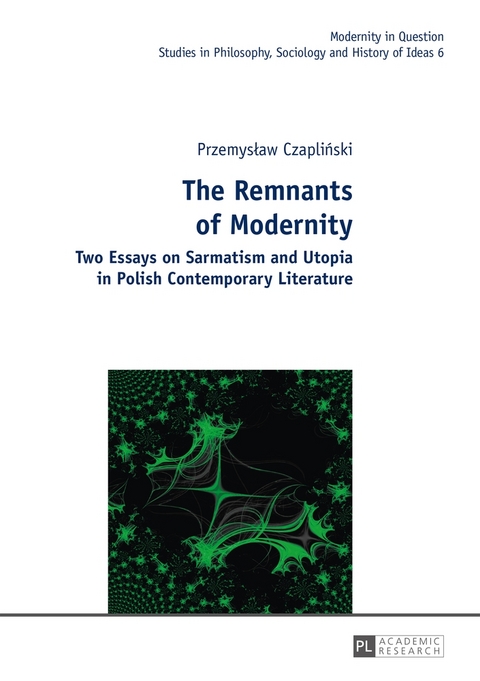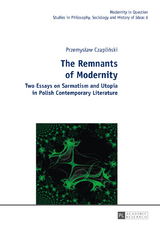The Remnants of Modernity
Two Essays on Sarmatism and Utopia in Polish Contemporary Literature
2014
Peter Lang Gmbh, Internationaler Verlag Der Wissenschaften
978-3-631-62924-6 (ISBN)
Peter Lang Gmbh, Internationaler Verlag Der Wissenschaften
978-3-631-62924-6 (ISBN)
Post-communist Polish culture faced a problem: how to reconcile a growing demand for individual autonomy with a growing need for interpersonal and interspecies solidarity. The author argues that writers sought a solution in the processing of remnants - in the productive destruction of two leftovers of modernity: Sarmatian and utopia.
Polish culture after 1989 has been defined by conflicts surrounding the remnants of modernity, phenomena marginalised during communism. The book considers two such phenomena: the search for a common tradition and the disappearance of utopia. Throughout the 19th and 20th centuries, romanticism provided a common tradition. After 1989, its place was assumed by Sarmatism, an elite and xenophobic pre-modern cultural formation, into which contradictory values were introduced, creating an explosive mixture of emancipation and populism. The second remnant, the heritage of utopia, is addressed in works whose critical visions of change are not comprehensive projects, but rather rebellions. They begin with a questioning of authority, and lead to a posthuman definition of humanity and interspecies solidarity.
Polish culture after 1989 has been defined by conflicts surrounding the remnants of modernity, phenomena marginalised during communism. The book considers two such phenomena: the search for a common tradition and the disappearance of utopia. Throughout the 19th and 20th centuries, romanticism provided a common tradition. After 1989, its place was assumed by Sarmatism, an elite and xenophobic pre-modern cultural formation, into which contradictory values were introduced, creating an explosive mixture of emancipation and populism. The second remnant, the heritage of utopia, is addressed in works whose critical visions of change are not comprehensive projects, but rather rebellions. They begin with a questioning of authority, and lead to a posthuman definition of humanity and interspecies solidarity.
Przemysław Czapliński is a professor of Polish literature at Adam Mickiewicz University in Poznań (Poland). He is the author of over a dozen books and the recipient of several national book awards. He writes on Polish modern and postmodern literature, the history of ideas, and the sociology and anthropology of literature.
Contents: The Remnants of Tradition: Sarmatism, Liberating Bodies, and Late Modernism - Remnants of the Future: Literature and the Creation of Utopia.
| Erscheint lt. Verlag | 15.12.2014 |
|---|---|
| Reihe/Serie | Modernity in Question ; 6 |
| Verlagsort | Berlin |
| Sprache | englisch |
| Maße | 148 x 210 mm |
| Gewicht | 360 g |
| Themenwelt | Geisteswissenschaften ► Sprach- / Literaturwissenschaft ► Literaturwissenschaft |
| Geisteswissenschaften ► Sprach- / Literaturwissenschaft ► Slavistik | |
| Geisteswissenschaften ► Sprach- / Literaturwissenschaft ► Sprachwissenschaft | |
| Schlagworte | Contemporary • Czaplinski • Essays • Kowalska • Literature • Malgorzata • Modernity • Polen • Polish • Post-Kommunismus • Przemyslaw • remnants • Romantik • Sarmatism • Utopia • Xenophobie |
| ISBN-10 | 3-631-62924-9 / 3631629249 |
| ISBN-13 | 978-3-631-62924-6 / 9783631629246 |
| Zustand | Neuware |
| Haben Sie eine Frage zum Produkt? |
Mehr entdecken
aus dem Bereich
aus dem Bereich
Buch | Softcover (2020)
Beuth (Verlag)
19,90 €




